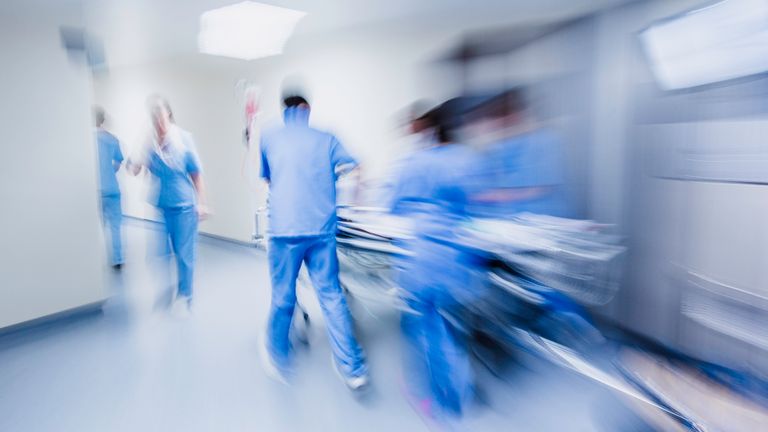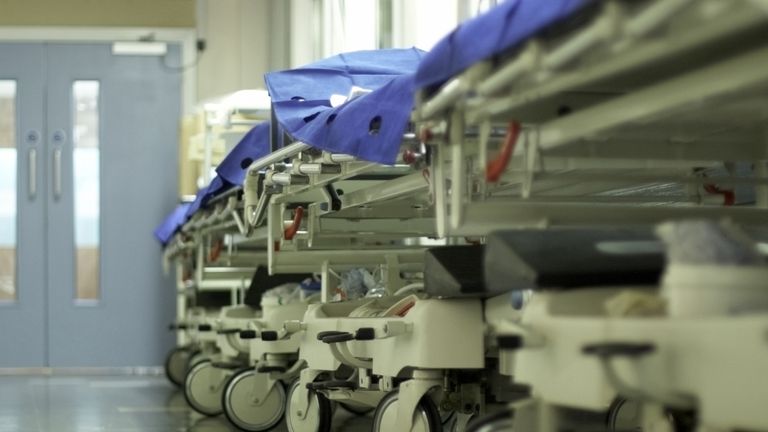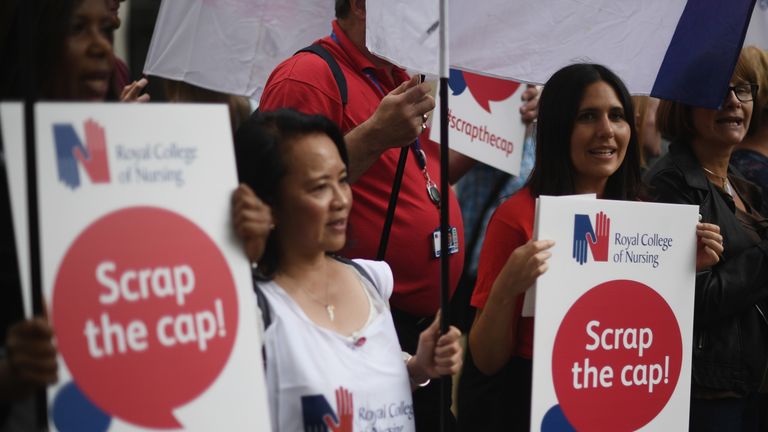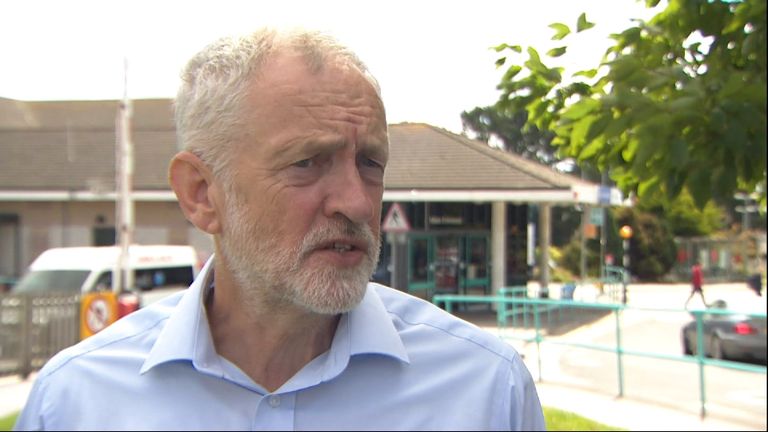NHS in 'toughest ever financial situation', says outgoing trust boss
Hospitals are pushed to their limits and the NHS is in the toughest financial situation since it was created, says one trust boss.
Saturday 28 October 2017 07:41, UK
The NHS is facing the most difficult financial circumstances in its history and may not be sustainable without a long-term increase in funding, one of its most experienced executives has told Sky News.
Peter Homa stood down as chief executive of Nottingham University NHS Hospital Trust this week after a 40-year career in the NHS that began when he worked shifts as an operating theatre porter.
In his final interview he offered a stark assessment of the challenges facing the health service as it tries to meet rising demand while enduring the tightest financial squeeze in its history.
"Financially, it is extremely challenging," he said.
"Nottingham, like 97% of hospital trusts in the UK, is in deficit. We are on track to hit our savings target but it is extraordinarily difficult.
"I have been a chief executive of NHS organisations for 27 years and it is fair to say that this is the toughest financial circumstances I have known.
"It is also objectively true to say it is the toughest in NHS history."
Mr Homa, who will take up a role as chairman of the NHS Leadership Academy in retirement, said increasing demand and expectations of care were hugely demanding.
"It is a combination of a really tough financial environment, alongside the quite proper requirement to deliver agreed standards of care.
"Having to achieve exquisitely tight financial targets while improving the quality of care is extremely challenging, it is the toughest it has ever been."
His assessment bears out the national picture.
Demand for NHS services is rising at around 4% a year but funding has fallen behind, rising at the slowest rate since it was founded in 1948.
The pressure has seen the NHS nationally fail to hit any of its main targets in each of the last 12 months, including the bellwether of 95% of A&E patients being seen within four hours.
Next year the NHS budget will rise by just 0.7%, a real-terms cut that means trusts across the country will again be asked to make savings.
In Nottingham the financial squeeze has seen a trust that ran at a surplus until 2014-15 pushed it into deficit.
Mr Homa has been required to make savings of more than £40m in each of the last four years, and the trust is on course to cut another £40m this year, taking the total to more than £200m in five years.
Demand has continued to rise however, and the trust has struggled to hit its targets.
In the year to date, 83.2% of patients have been seen within four hours.
Mr Homa's final months in the job have been spent helping plan for what many fear will be a hugely challenging winter across the NHS.
He says that "winter pressure" has become year-round pressure with no appreciable drop-off in late spring and early summer.
Queens Medical Centre A&E department in Nottingham is experiencing demand far greater than it was designed for, and is currently seeing just over 83% of patients within four hours.
Mr Homa is confident the service is better prepared than in previous years, largely because of greater co-operation with social and community care providers.
"Winter is is a complex interlocking jigsaw and the reason I am more confident this year is that we have some excellent work across the wider social care sector. We will be able to do a better job because of the collaboration.
"Our A&E was designed in the 1960s and built in the 1970s for a maximum of 350 patients a day.
"We regularly see 500 people a day and last Monday saw 700, the highest ever.
"And it is not just the number of patients, but they are elderly and they have complex needs, and we need to make sure that they are all expertly attended to."
His assessment, born of frontline experience, is particularly valuable as hospital managers have become reluctant to speak out since two chief executives of poorly performing hospital resigned last month under pressure from regulators.
He offers a curt assessment of the re-structuring imposed by Andrew Lansley's 2012 Health and Social Care Act: "If it didn't exist you wouldn't invent it" - but is positive about the attempt to work around it using sustainability and transformation plans, or STPs.
These are intended to make health providers in local areas work together more closely, putting the patient rather than the institutions first.
"What experience has taught me, by which I mean my mistakes, is that if we focus on the patients we will get it right," says Mr Homa.
But he is pessimistic about the long-term funding picture, and says the Government should commit to increasing the share of GDP spent on healthcare.
"The future is extremely challenging on the current funding model," he says.
"The Government faces profound political questions that have to be addressed in terms of what share of GDP they spend.
"We know the UK has slipped down the league table in terms of share, and my own view is that the NHS needs sustained improvements in funding. Without it the future is really challenging."
He would support a pay rise for staff - who are ever-more stretched to keep up with demand - but warns the NHS cannot afford to pay for it from existing funds without drastic cuts to services and staff.
"Our staff and public sector workers in general have served the country without an increase in pay for a long time and the deserve a rise, but any increase must be properly funded.
"We could not fund any pay rise from within the NHS, we are already stretched. It would be extraordinarily difficult.
"Here in Nottingham it would mean on top of the £40m savings we are already making we would have to find £30m more.
"We'd have to do less, we'd have to lose staff, it would be totally impossible in my view."
It is the NHS staff that bring him to sound his most optimistic note when looking back on a career that has seen profound change in the health service.
When Mr Homa began his career in the 1970s the fax machine was a cutting-edge development.
Today Nottingham offers robotic operations and advanced radiography, but he says the commitment of the people has not changed: "What is undiminished is the passion and absolute determination of staff to do the very best they can for patients, which is why it has been a privilege to serve the NHS in Nottingham and elsewhere."









